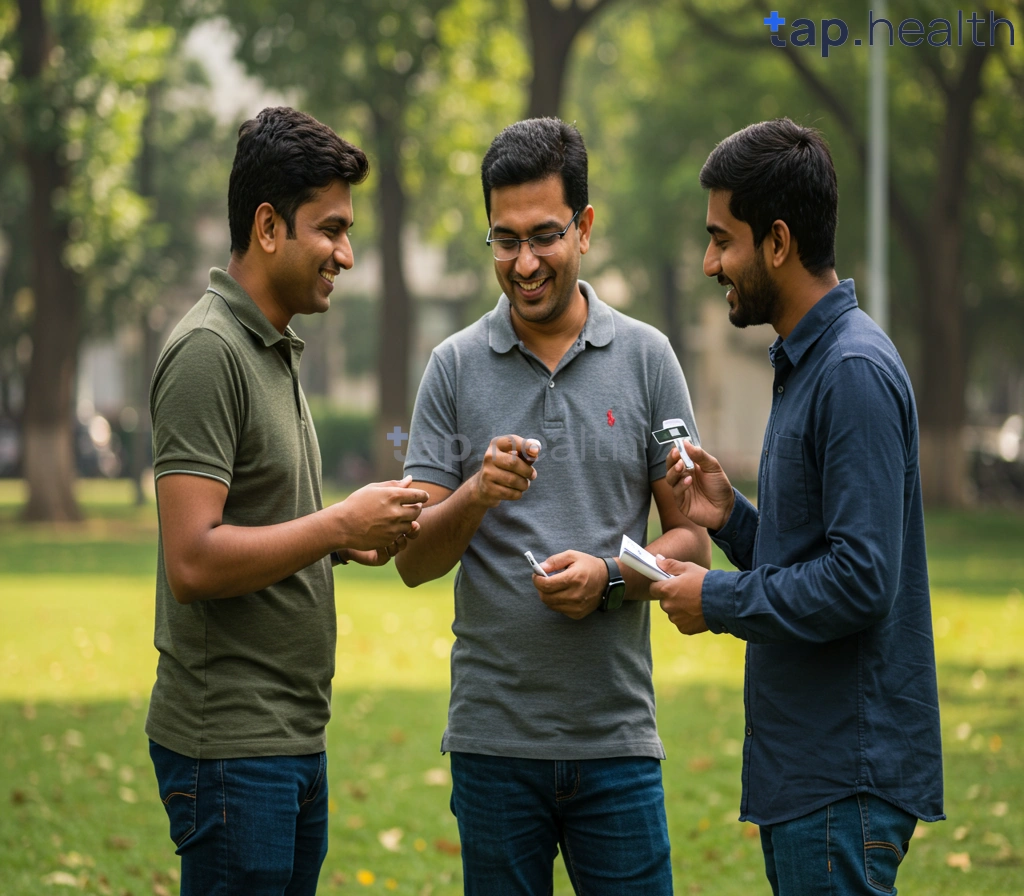Table of Contents
- Men’s Health Month: Understanding Your Diabetes Risk
- Diabetes Prevention: A Guide for Men This June
- Simple Steps to Prevent Diabetes: A Men’s Health Month Checklist
- Is Diabetes Affecting Your Health? Early Detection & Management
- Men’s Health Month Focus: Diabetes Prevention and Early Diagnosis
- Frequently Asked Questions
- References
June is Men’s Health Month, and this year, we’re shining a spotlight on a critical issue affecting millions: diabetes. Did you know that men are disproportionately affected by this chronic disease? This blog post focuses on Men’s Health Month: Prioritizing Diabetes Awareness and Prevention, providing you with practical tips and essential information to understand your risk, make informed choices, and take control of your health. We’ll explore simple lifestyle changes and preventative measures you can implement today to significantly reduce your chances of developing diabetes. Let’s get started on your journey to a healthier you!
Men’s Health Month: Understanding Your Diabetes Risk
Men face a disproportionately higher risk of developing diabetes compared to women, with a global prevalence of 8.9% versus 7.8%, according to the World Health Organization (WHO). This disparity is significant and highlights the critical need for increased diabetes awareness and preventative measures, particularly among men in Indian and tropical countries. These regions often face unique challenges, including limited access to healthcare, dietary changes influenced by traditional cuisines, and lifestyle factors contributing to higher diabetes rates.
Recognizing Your Risk Factors
Several factors increase a man’s susceptibility to type 2 diabetes. These include a family history of diabetes, obesity, particularly abdominal obesity, physical inactivity, and unhealthy dietary habits. In many Indian and tropical countries, diets rich in refined carbohydrates and saturated fats are common, further increasing the risk. Understanding your family history and lifestyle choices is crucial in assessing your personal risk. Regular health check-ups, including blood glucose testing, are vital, especially as you age. As you age, managing diabetes can become more complex, so it’s beneficial to understand the Managing Diabetes as You Age: Challenges and Solutions.
Taking Control of Your Health
Fortunately, the development of type 2 diabetes is often preventable through lifestyle modifications. Simple changes can make a significant difference. Regular exercise, even a moderate amount of daily activity, is paramount. Adopting a balanced diet rich in fruits, vegetables, and whole grains, while limiting processed foods and sugary drinks, is crucial. Maintaining a healthy weight through diet and exercise is another key preventative strategy. Remember to consult with your doctor or a registered dietitian for personalized advice tailored to your specific needs and cultural context. For more effective strategies, check out these 10 Proven Tips for Effective Diabetes Management.
Taking Action This Men’s Health Month
This Men’s Health Month, prioritize your well-being. Schedule a check-up, discuss your diabetes risk with your healthcare provider, and implement lifestyle changes to reduce your risk. By making conscious choices and taking proactive steps, you can significantly improve your chances of a healthier and longer life. Remember, early detection and prevention are key to managing diabetes effectively.
Diabetes Prevention: A Guide for Men This June
June is Men’s Health Month, a crucial time to focus on preventative measures, especially concerning diabetes. A staggering 61% of individuals with diabetes are between 20 and 64 years old, highlighting the importance of early intervention and lifestyle changes, particularly in Indian and tropical countries where diabetes prevalence is rising. Understanding your risk factors is the first step.
Understanding Your Risk
Men in Indian and tropical countries often face unique challenges. Factors like genetics, dietary habits rich in carbohydrates and processed foods, and a less active lifestyle contribute to higher diabetes risks. The heat and humidity can also impact hydration and energy levels, potentially affecting blood sugar control. Regular check-ups are vital, especially if you have a family history of diabetes or are experiencing symptoms like increased thirst, frequent urination, or unexplained weight loss.
Practical Steps for Prevention
Making small, sustainable changes can significantly reduce your risk. Prioritize a balanced diet, focusing on fresh fruits, vegetables, and lean proteins. Incorporate regular physical activity into your routine – aim for at least 30 minutes of moderate-intensity exercise most days of the week. Even short bursts of activity throughout the day can help. Managing stress through techniques like yoga or meditation is also beneficial for overall health and blood sugar regulation. Staying well-hydrated, especially in hot climates, is crucial.
Taking Action This Men’s Health Month
This June, take charge of your health. Schedule a check-up with your doctor to assess your risk factors and discuss preventative strategies. Remember, even small changes can make a big difference in preventing diabetes and improving your overall well-being. Prioritizing your health now is an investment in a healthier future. Don’t delay – your health is worth it. For more in-depth information on managing diabetes effectively, check out 10 Proven Tips to Effectively Manage Diabetes | Simple Guide. And because diabetes can impact heart health, learning how to Protect Your Heart from Diabetes: 5 Essential Steps is also crucial.
Simple Steps to Prevent Diabetes: A Men’s Health Month Checklist
This Men’s Health Month, let’s focus on a critical issue impacting men in India and across tropical countries: diabetes. The good news is that up to 80% of Type 2 diabetes cases can be delayed or prevented through simple lifestyle changes. This means you have significant power over your health. Making these changes is crucial for preventing diabetes and improving overall well-being.
Prioritize Healthy Eating
Adopting a balanced diet rich in fruits, vegetables, and whole grains is essential. Limit processed foods, sugary drinks, and refined carbohydrates, common in many Indian and tropical diets. Focus on incorporating foods traditionally eaten in your region that are naturally low in sugar and high in fiber. Think about how you can adapt your diet to be healthier and more diabetes-preventative.
Increase Physical Activity
Regular physical activity is paramount. Aim for at least 30 minutes of moderate-intensity exercise most days of the week. This could include brisk walking, cycling, or engaging in traditional sports popular in your region. Remember, even small increases in daily movement can have a significant impact. Find activities you enjoy to ensure long-term adherence.
Manage Your Weight
Maintaining a healthy weight is crucial in diabetes prevention. Obesity significantly increases your risk. Focus on gradual weight loss through diet and exercise. Consult a healthcare professional or a certified nutritionist for personalized guidance tailored to your needs and preferences. Regular check-ups are important for monitoring your progress and addressing any potential concerns.
Monitor Your Blood Sugar
Regular blood sugar checks are vital, especially if you have a family history of diabetes or fall into a high-risk category. Early detection is key to effective management and prevention. Consult your doctor to understand your risk level and appropriate testing frequency. Early intervention is crucial to prevent the onset of diabetes. For those already diagnosed, learning how to prevent long-term complications of diabetes is equally important.
This Men’s Health Month, take control of your health. These simple steps, tailored to the context of Indian and tropical countries, can significantly reduce your risk of developing Type 2 diabetes. Schedule a check-up with your doctor today and begin your journey to a healthier, diabetes-free life. Maintaining healthy habits can significantly improve your quality of life, even if you have type 1 diabetes. Check out these 10 daily habits for better type 1 diabetes control for additional advice.
Is Diabetes Affecting Your Health? Early Detection & Management
Understanding the Silent Threat
Diabetes is a significant health concern globally, and alarmingly, 50% of diabetes cases worldwide remain undiagnosed. This statistic is particularly relevant in Indian and tropical countries, where lifestyle changes and genetic predispositions contribute to higher prevalence rates. Early detection is crucial in preventing or delaying serious complications like heart disease, kidney failure, and blindness. Ignoring symptoms can have devastating long-term consequences.
Recognizing the Warning Signs
Common symptoms of diabetes include increased thirst and frequent urination, unexplained weight loss, increased hunger, blurry vision, and slow-healing sores. However, many individuals experience no noticeable symptoms, highlighting the importance of regular health check-ups, especially for those at higher risk. This includes individuals with a family history of diabetes, those who are overweight or obese, and those leading sedentary lifestyles. In tropical climates, certain dietary habits and limited access to healthcare can exacerbate the issue.
Taking Control: Prevention and Management
Fortunately, diabetes can often be managed effectively through lifestyle changes. A balanced diet emphasizing whole grains, fruits, and vegetables, alongside regular physical activity, can significantly improve blood sugar control. Weight management is also crucial, as even modest weight loss can make a positive impact. Consult your doctor for personalized advice on managing your blood sugar levels, including medication if necessary. For those living in Indian and tropical countries, incorporating traditional remedies and practices, when appropriate and under medical supervision, might offer additional support. Understanding the link between obesity and diabetes is key, so consider reading Understanding the Link Between Diabetes and Obesity for further insights.
Act Now: Prioritize Your Health
Don’t let undiagnosed diabetes jeopardize your well-being. Schedule a check-up today and take proactive steps towards a healthier future. Regular screenings are your best defense against this silent threat. In regions with limited access to healthcare, seek out community resources and support groups to learn more about diabetes prevention and management. Your health is your greatest asset – protect it. Furthermore, How Diabetes Education Enhances Health Outcomes offers valuable information on improving management through education.
Men’s Health Month Focus: Diabetes Prevention and Early Diagnosis
Diabetes disproportionately affects men in India and tropical countries, often leading to serious health complications. While women with diabetes face a 40% higher risk of heart disease compared to men with diabetes, this doesn’t diminish the critical need for men to prioritize their health. Early detection and prevention are paramount in mitigating the risks associated with this chronic condition. This Men’s Health Month, let’s focus on empowering men to take control of their well-being.
Understanding the Risks
Many factors contribute to the higher prevalence of diabetes among men in these regions, including lifestyle choices, genetics, and limited access to healthcare. Sedentary lifestyles, unhealthy diets high in processed foods and sugars, and lack of regular physical activity are major contributors. The prevalence of type 2 diabetes is particularly concerning, often linked to obesity and insulin resistance. Understanding these risks is the first step towards proactive management.
Taking Control: Practical Steps
This Men’s Health Month, prioritize these simple yet impactful changes: Incorporate regular exercise into your routine—aim for at least 30 minutes of moderate-intensity activity most days of the week. Adopt a balanced diet rich in fruits, vegetables, and whole grains, while limiting processed foods, sugary drinks, and unhealthy fats. Schedule regular check-ups with your doctor, including blood glucose tests, to monitor your blood sugar levels and detect any abnormalities early. Even small changes can significantly reduce your risk. Knowing the 10 Early Signs and Symptoms of Diabetes? can also be incredibly helpful in early detection.
Prioritizing Your Health
In India and tropical countries, access to healthcare varies. It’s crucial to seek preventative care and early diagnosis. Don’t wait for symptoms to appear; proactive health checks are vital. Talk to your doctor about your family history of diabetes and discuss personalized strategies for prevention and management. For more on creating a personalized approach, check out Personalized Diabetes Control: Your Key to Better Health. This Men’s Health Month, let’s make diabetes awareness and prevention a priority for all men. Take charge of your health today.
Frequently Asked Questions
Q1. Why are men at higher risk of diabetes, especially in certain regions?
Men face a disproportionately higher risk of diabetes compared to women, particularly in India and tropical countries. This increased risk is linked to a combination of genetic factors, diets high in refined carbohydrates and saturated fats, and less active lifestyles.
Q2. How can I reduce my risk of developing type 2 diabetes?
Type 2 diabetes is largely preventable through lifestyle changes. Regular exercise, a balanced diet, and maintaining a healthy weight are key. Small changes can make a big difference.
Q3. What are the early warning signs of diabetes?
Many individuals with diabetes experience no symptoms initially. This highlights the importance of regular check-ups, including blood glucose testing, for early detection.
Q4. What steps should I take to get started with diabetes prevention?
Start by scheduling a check-up with your doctor to discuss your risk and get personalized advice. A registered dietitian can also help you create a balanced meal plan, and incorporating regular exercise into your routine is vital.
Q5. Is it possible to reverse or significantly improve diabetes through lifestyle changes?
While a complete reversal isn’t always possible, significant improvements in blood sugar levels and overall health are achievable through lifestyle modifications such as diet and exercise. Early intervention is key.
References
- A Practical Guide to Integrated Type 2 Diabetes Care: https://www.hse.ie/eng/services/list/2/primarycare/east-coast-diabetes-service/management-of-type-2-diabetes/diabetes-and-pregnancy/icgp-guide-to-integrated-type-2.pdf
- What is Diabetes: https://www.medschool.lsuhsc.edu/genetics/docs/DIABETES.pdf



